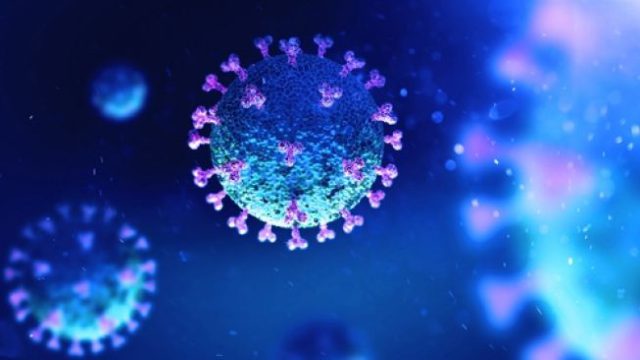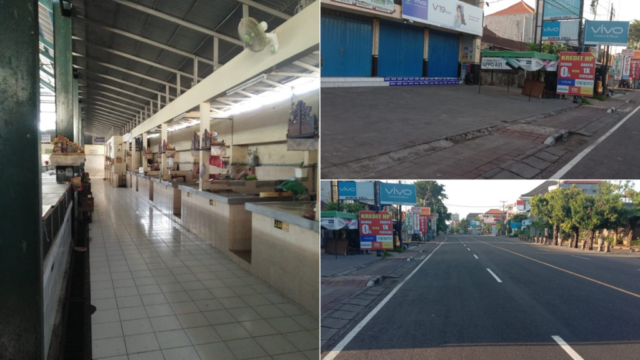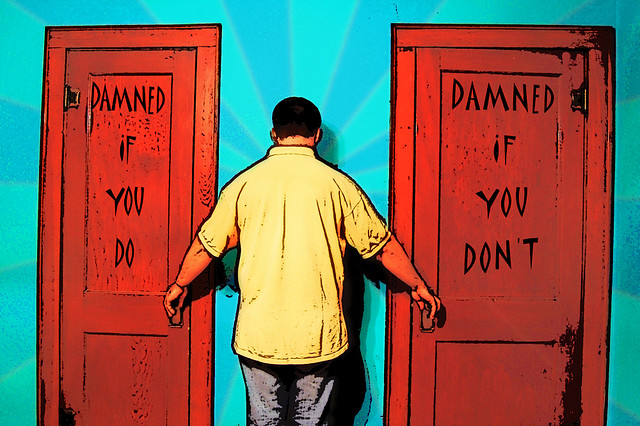EDITORIAL: COVID-19 – Damned if We Do, Damned Also if we Don’t

I’ve had a change of heart.
While, in the past, I disparaged those signing petitions calling on the Government of Indonesia and Provincial Administration of Bali to reopen the Island to international tourism, the developing global Pandemic has caused me to reconsider my position. I now favor reopening Indonesia’s and Bali’s border to the world, providing visitors invariably meet established entry requirements, and conform to all cleanliness, health, and safety protocols (CHS) mandated by Indonesia’s Ministry of Tourism.
I still reject the idea of “government by petition,” and the resulting “devil may care” stance that urges the reopening of all borders to let the virus sort itself out. At the same time, it remains painfully apparent that the world, and by extension Bali, cannot simply afford to sit out this Pandemic and reopen for business at some still indeterminate date in the future.

The risk of infections by COVID-19 will remain with us until some point long in the distant future. Test of trial vaccines will take time to not only test their effectiveness but even much longer to rule out any dangerous side-effects of vaccines that, left unchecked, could prove worse than the disease itself. Even if a safe and effective vaccine is discovered, how long will it take to vaccinate a sufficiently large proportion of humankind to halt what is proving to be a particularly virulent and adaptable virus?
History demonstrates that the development of vaccines to fight potentially fatal viruses are never done in short order. Polio or poliomyelitis describes three diseases that have afflicted humanity for centuries. An upsurge of the disease globally in the late 1940s and early 1950s prompted Hilary Koprowski to administer a trial vaccine in February 1950. Between 1952 – 1955, another vaccine developed by Jonas Salk was found effective in a two vaccination therapy, and finally, in 1957-1958, Albert Sabin developed an oral vaccine that replicates in the gut and, after as many as three dosages, provided almost absolute immunity. After only four years of testing after its initial launch, Sabin’s Oral Vaccines were deemed safer and superior to the vaccines developed by Koprowski and Salk, earning an official license in 1962. Now, nearly 60 years on, polio is still with us presented in isolated corners of the globe.
Vaccination takes time, time which is often measured in decades.
Similarly, the Human Immunodeficiency Virus (HIV) was first isolated and identified in May 1981 and is, forty years on, still without a vaccine. However, life-saving treatments and therapies have made the treatment of the once-fatal disease now highly manageable.
History remains clear on one point. While vaccines are being tested and trialed at an unprecedented rate of speed to immunize the world against COVID-19, there are no guarantees that an effective vaccine free of unacceptable side-effects can be produced in the near future. Moreover, even if a vaccine is discovered, it may take years to vaccinate a meaningful proportion of the human population to halt the global march of COVID-19, let alone sufficiently restore the global confidence to travel again.
One thing that has not changed in my position is that I continue to stand on the side of science. My earlier stance was that science, and science alone should lead all decisions in determining when Bali should reopen its doors to international tourism. That remains my position, now enlightened and informed by the realization that COVID-19 will almost certainly remain a fact-of-life for years to come.
In short, if Bali remains closed to the world through 2021 and possibly beyond, the economic devastation to the Island will be beyond redemption. Now, standing at the beginning of September 2020, the hints of things far worse to come for Bali can be seen in every aspect of daily life. Thousands of once relatively prosperous hotel and tourism workers have lost their jobs. Supermarkets and even traditional markets are empty, reflecting the lack of buying power and the absence of Bali visitors. And something not seen since the darkest days of WWII and the 1963 eruption of Mount Agung, there is a growing number of Bali residents going to bed hungry.
“Now, standing at the beginning of September 2020, the hints of things far worse to come for Bali can be seen in every aspect of daily life. Thousands of once relatively prosperous hotel and tourism workers have lost their jobs. Supermarkets and even traditional markets are empty, reflecting the lack of buying power and the absence of Bali visitors. And something not seen since the darkest days of WWII and the 1963 eruption of Mount Agung, there is a growing number of Bali residents going to bed hungry.”
Bali Update Editorial – Edition #1227
Science continues to color my recommendation on the best course of action in the unfolding crisis of a global pandemic.
Bali should reopen its borders to the world and do so on its own terms, led invariably by science and “best global practice” on limiting the spread of COVID-19.
The Indonesian Government should allow Bali to reopen for international tourism on a trial case basis under a set of stringently enforced protocols encompassing;
- Rigorous medical screening at all seaports and Bali’s Ngurah Rai Airport.
- Mandatory supervised quarantine for suspected cases of COVID-19 among both island residents and visitors.
- Rules prohibiting mass public gatherings of any kind.
- The closure of bars and nightspots as demonstrably known starting points for COVID-19 contagion clusters.
- A more comprehensive application of the ongoing certification program governing how restaurants, shops, and tourist attractions can be operated.
- Continuing the current mandatory use of a surgical mask for everyone venturing into public places.
The simple truth of the matter is that foreign tourists’ return to Bali will not happen overnight, even with such stringent measures in place. As presented earlier in “Editorial: A Rethink of Bali’s Recovery” – border and travel controls in place in key source markets for Bali, the ongoing worldwide recession, fundamental changes in the very nature of the global aviation industry, and the reduced purchasing power of the travelers who once holidayed in Bali all suggest that Island visitors will return at a very slow pace and, most probably, at only a fraction of their formal totals.
Is there any other approach that makes more sense than for Bali to reopen to international tourism carefully on its own strict terms of engagement? Like it or not, COVID-19 will remain a steadfast – albeit unwelcome – companion of the human race for the foreseeable future.
“Is there any other approach that makes more sense than for Bali to reopen to international tourism carefully on its own strict terms of engagement? Like it or not, COVID-19 will remain a steadfast – albeit unwelcome – companion of the human race for the foreseeable future.”
Bali Update Editorial – Edition #1227
Those seeking to fight and eliminate the disease from the face of the earth, albeit engaged in a noble world war, based on what we know of past battles against infectious diseases, may be tilting at windmills until “science” eventually declares them victorious.
In the meantime, “science,” on a more practical level, will also rule the day as we manage to find ways to continue to pursue our personal and commercial lives in ways that treat, minimize, and control the spread of the Coronavirus.
Have no doubt that the world is under siege, surrounded by a formidable foe – Novel Coronavirus. At a time when we seek protection within the fortified walls provided by the walls of our homes and territorial borders, a battle of epic proportions is underway. Staying with the analogy of sheltering behind fortified walls, any military strategist knows that those cowling and hiding from the enemy in this manner must inevitably venture beyond their defensive boundaries to engage the enemy or risk slow starvation and eventual defeat languishing behind closed borders and their castle walls.
Such is the case with COVID-19. We can continue to hide from the virus behind closed borders where we may eventually die from either the disease itself or the economic strangulation resulting from a collapsed economy. However, in the end, the more intelligent course of action may prove to be to restart our economies reconfigured to operate in a “new era” of stringent rules and procedures. The “real” and more practicable battle is controlling and containing the disease until the ultimate and still distant goal of finally eliminating COVID-19 can be declared.
The old adage rings truer than ever before in Bali’s fight against the Coronavirus: “Damned if we do. Damned also if we don’t.”
Related Article






